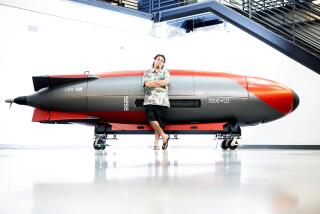Motorola Taps Lockheed for Network of Satellites : Communications: The worldwide mobile project, Iridium, will cost $2.3 billion and may open vast areas to phone service.
- Share via
In one of the largest commercial space deals in history, Motorola Inc. on Monday selected Lockheed Corp.’s missiles and space company in Sunnyvale, Calif., to build 77 satellites for a worldwide mobile communication system that will cost $2.3 billion.
The award marks Lockheed’s first entry into the competitive commercial satellite industry, which has undergone rapid growth in the past several years as new uses for satellites have been developed in television broadcasting and business communications networks.
The Motorola system, dubbed Iridium and unveiled last June, would position 77 satellites in low Earth obit and allow users of special hand-held telephones to place and receive calls anywhere in the world.
Unlike current cellular technology, the system would open up vast undeveloped and sparsely populated areas that have no telephone service. But the new Iridium system would not have as much capacity and therefore is not intended as a substitute for cellular mobile phones.
Motorola will build the communications packages to be installed into the Lockheed-produced spacecraft, which will include a propulsion system, guidance package and power supply system. A separate competition is being conducted for the production of the satellite antennas. Lockheed’s portion of the work could represent as much as half of the $2.3 billion.
“Lockheed has been seeking opportunities to use its core skills in areas related to its defense business, and this is a perfect fit,” Michael Brodsky, Lockheed manager of Iridium program development, said in an interview. “We think it is an important thing for us to do as the defense business changes.”
To Wall Street, Motorola’s selection of Lockheed indicates that the project has gained financial support, even though cost and technical questions remain. “An award signals that it is further along but not a done deal,” said Paine Webber analyst Jack Modzelewski. “The expense continues to go up.”
Brodsky said production of the 77 satellites accounts for most of the $2.3 billion cost of the system, although the communications network will also require ground stations and the development of the hand-held telephones.
At $2.3 billion, the satellites will cost roughly $30 million each. Since they are intended to have an orbital life of five years, 16 of the satellites would have to be replaced annually, representing potentially a $480-million continuing annual business for Lockheed.
Despite the enormous size of the agreement, it will not result in a hiring windfall, Lockheed spokesman Keith Mordoff said. “At this point, it allows us to maintain our work force,” he said. Lockheed employs 21,000 at its Sunnyvale operation.
Motorola selected Lockheed out of a field of 10 foreign and seven domestic satellite producers, company spokesman Lawrence Moore said.
Moore declined to identify any of the competitors. Los Angeles-based Hughes Aircraft, the world leader in commercial communications satellites, did not bid for the program, according to Hughes spokesman Donald M. O’Neal.
Lockheed’s missile and space company is best known as the premier builder of U.S. spy satellites, which are capable of providing detailed video images from space. The firm has produced more than 350 low Earth orbiting satellites.
“Lockheed’s long and successful history in designing and building low Earth orbiting satellite systems was a key factor in our decision,” said Durrell Hillis, general manager at Motorola’s satellite communications unit in Chandler, Ariz.
Lockheed made its first foray into military communications satellites during the 1980s with the controversial Milstar system, the long-delayed satellite that was designed to operate during nuclear wars.
The Iridium system will have little in common with Milstar or commercial communications systems, in which satellites orbit at 22,500 miles above the Equator.
The Motorola concept is to place the 77 satellites, just 413 miles above Earth and allow them to “hand off” calls between satellites to connect users--either with mobile or conventional phones--around the world. All the mobile telephones in the Iridium system would be constantly tracked for their geographic location.
The Iridium satellites will weigh about 1,000 pounds, but Modzelewski said the satellite design has been dogged by weight problems and is several hundred pounds too heavy. The most common high-orbit satellites weigh 1,400 pounds and cost $50 million, while the most advanced satellites weigh 3,000 pounds and cost $100 million.
Although Motorola and Lockheed would be partners in the production of the satellites, the Iridium system would be owned and financed by a consortium. Brodsky said he could not discuss whether Lockheed would be an investor in the consortium.
Previously, Motorola officials have said they were discussing their venture with firms in Australia, Japan, Hong Kong and Britain.
More to Read
Inside the business of entertainment
The Wide Shot brings you news, analysis and insights on everything from streaming wars to production — and what it all means for the future.
You may occasionally receive promotional content from the Los Angeles Times.










